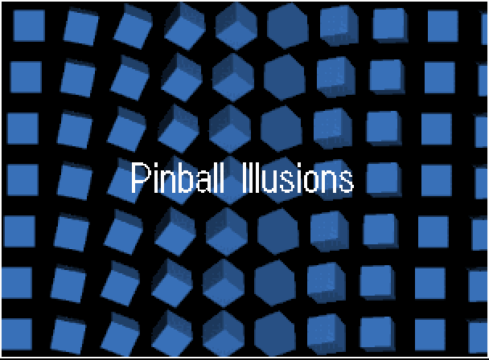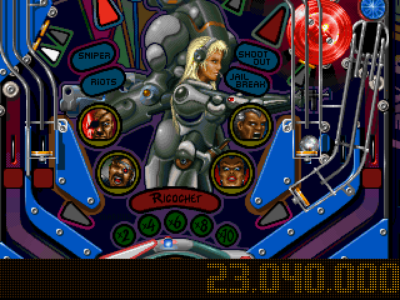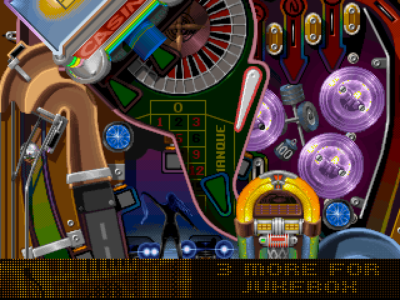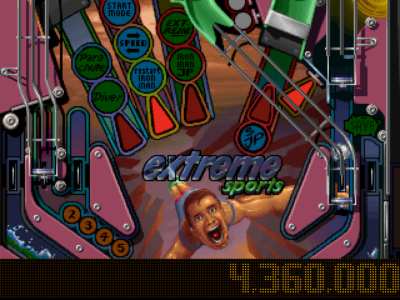
Pinball Illusions
Written by: Rik
Date posted: October 20, 2002
- Genre: Action
- Developed by: Digital Illusions (port by Frontline Design)
- Published by: 21st Century Entertainment
- Year released: 1995
- Our score: 7
We don’t see many pinball games around these days, but back in the mid-1990s, they were all over the place. In fact, developers 21st Century seemingly made a living from churning out an interminable number of near-identical titles during this period, and although they apparently released a non-pinball game at some stage, needless to say, we can’t tell you anything about it. It remains open to speculation whether their strategy was based upon a genuine demand for pinball or a development team of rather restricted talents, but in any case it’s clear that someone buys these games.
Who exactly? Well, obviously I’m guessing here, but it’s probably a mixture of two groups. On the one hand, we have hardcore pinball fans, the type who’ve actually racked up high-scores on the real deal before trying out the virtual alternative; and on the other we have the casual pinball player, the type who buys a pinball game to while away the time between occasions when they’re doing more interesting things.

This is the police table, which I rule on. Probably best to ignore the score at the bottom there, though.
I fall firmly into the latter group: I bought Pro Pinball: The Web because it was in the bargain bucket, got a dirt-cheap copy of Codemasters’ Psycho Pinball, and, er, copied Pinball Illusions from someone (not big or clever, kids). And as such, I can’t (nor do I have any desire to) compare the “real thing” with these “games”, because it’s all about how much “fun” you “have” while “playing” ‘them’.
Ahem. Pinball Illusions is a lot of fun. It’s comfortably the most enjoyable pinball game I’ve ever played, and it even managed to keep me up into the early hours trying to beat my high score on my favourite table. It looks as if it was made in the mid-90s, which of course it was – the graphics are 320×400, the music sounds like a bunch of .mod files made by techno-mad German students, there are only three tables, and it only runs in DOS – but once it grabs hold of you, it doesn’t let go.
If you start playing games in the kind of half-arsed way that I do, then you can load up Pro Pinball, marvel at the high-resolutions you can put it in, and turn it off half-an-hour later having got absolutely nowhere near the absurdly high scores on the tables in question. Even a quick read of the manual (surely the last resort) proves to be largely futile. With Illusions I didn’t even have the manual, but with a bit of practice I managed to work each table out by myself and make some inroads into that high-score table. The promise of discernible progress and the occasional sign that you may just be getting the hang of it are what give Illusions that little bit extra in my eyes. It’s a cliché, but it’s easy to play and difficult to master.
At the end of the day, we’re talking about a game whose primary function is to keep you entertained while your dinner’s in the oven, so it bloody well shouldn’t be difficult to get into. The common nightmare of everyone who plays computer games is that one day they’ll find themselves playing Solitaire for hours on end – and enjoying it. Trouble is, faced with the intense depth of many modern titles, some will occasionally find that this nightmare becomes a reality. We all have to have a simple, addictive, high-score-type game in our lives, and Pinball Illusions fits the bill nicely.
God knows where you’ll be able to find a copy, or if you’ll be able to get it to run on your computer [EDIT: GOG.com and DOSBox, respectively, should help you here], but if you ever do, it’ll be worth it. Unless of course you’re one of the aforementioned hardcore types, in which case you’ll be wasting your time with that Visual Pinball emulator. In any event, let us remember Pinball Illusions as a really rather spiffing pinball game and honour it with an exalted place within the Force for Good.
I rule on the Police table by the way.




 Posts
Posts